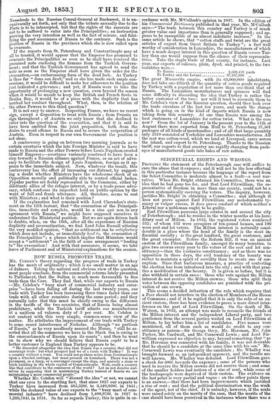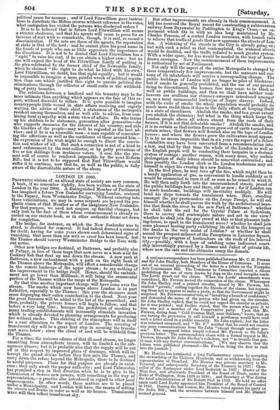SEIGNEURIAL RIGHTS AND WRONGS.
PROBABLY the statement of the Peterborough case will -suffice to cure the abuse that it exposes ; and it will not be the less effectual in this particular instance because the language of the report from the Select Committee is moderate almost to a fault—a cool nar- rative. When Mr. Bright obtained his Committee, there was an idea that he had gone too far, and that Lord Fitzwilliam, the re- presentative of freedom in more than one county, could not be a person systematically coercing the voters. The inquiry, however, justifies Mr. Bright in obtaining a Committee ; and although it does not prove against Earl Fitzwilliam any melodramatic) ty- ranny or vulgar excess, it does prove conduct of which neither a Liberal nora nobleman ought to be guilty.
Earl Fitzwilliam possesses large estates in and around the city of Peterborough ; and he resides in the winter months at his here- ditary seat of Milton. In 1852, the registered voters numbered 532; of whom 432 were occupiers of ten-pound houses, and 100 were scot and lot voters. The Milton interest is naturally consi- derable in a place where the head of the family is the most in- fluential socially ; is the great landlord, the great customer, and the great exemplar. Before the Reform Bill, it was an ancient custom of the Fitzwilliam family, amongst its many bounties, to give two crowns every year to the voters of the scot and lot con- stituency—then the exclusive constituency; and as there was no opposition in those days, the evil tendency of the bounty was rather to maintain a spirit of servility than to create one of cor- ruption. Since that barbarous measure, a practice of contesting the election has been introduced into the city ; and with that prac- tice a modification of the bounty. It is given as before, but it is also withheld in certain eases: those who vote against the Milton interest do not receive the Milton crowns ; those who split their votes between the opposing candidates are punished with the pri- vation of one crown.
This seems a decided infraction of the rule which requires that a Peer should not interfere in the election of Members of the House of Commons ; and if it be replied that it is only the relic of an an- cient custom, there has been evidence to prove a more direct inter- ference on the part of Lord Fitzwilliam. On the death of Mr. Watson, in 1852, an attempt was made to reconcile the friends of the Milton interest and the independent Liberal party, and two gentlemen from the several parties waited on Lord Fitzwillitim at Milton, to lay before him a-list of candidates. Five names were mentioned, all of them such as would do credit to any con- stituency or patron—Sir George Grey, Mr. Horsman, Mr. John Parker, Mr. Cardwell, and Mr. Cornewall Lewis ; and Lord Fiz- villiam expressed no objection to any, beyond remarking, that "as Mr. Horsman was connected with his family, it was not desirable that he should be a candidate at the same time with his son." Mr. Cornewall Lewis was eventually the candidate ; Mr. Whalley was brought forward as an independent opponent, and the results are well known. Mr. Whalley was defeated. Lord Fitzwilliam gave a check for 500/. towards the expenses ; some of the persons who used to receive the Milton crowns did not receive them ; and some of the smaller holders had notices of a rise of rent, while some of the tradespeople were deprived of their custom. The evidence on the last point is very partial and vague : on the other points there is an answer,—that there had been improvements which justified a rise of rent ; and that the political discrimination was the work of the agent, not of the chief. It is unlucky, however, if the rents were raised solely on the merits of the case, that the merits of the case should have been perceived in the instances where there was a
political cause for acumen ; and if Lord Fitzwilliam gave instruc- tions to distribute the Milton crowns without reference to the votes, what castigation has visited the persons who disobeyed orders ? It is to be believed that in future Lord Fitzwilliam will secure a stricter obedience, and that his agents will cease to press for an increase of rent with so remarkable, though, it is said, so casual a discrimination. If the acts are those of the agents, the reputation at stake is that of the lord ; and he cannot place his good name in the hands of people who can so little appreciate the importance of his directions. It is not to be denied that Lord Fitzwilliam has a "right" to raise his rent, if he can obtain a higher sum ; but no one will expect the head of the Fitzwilliam family of putting in the plea celebrated by the former chief of the Newcastle family, when he claimed "the right to do what he liked with his own." Lord Fitzwilliam, no doubt, has that right equally ; but it would be impossible to imagine a more painful wreck of political reputa- tion than one which justified this right to pursue political dis- criminations through the collector of small rents or the withhold- in&of petty bounties.
The relations between a landlord and his tenantry may be far more intimate than anything which appears on the face of this re- port, without discredit to either. It is quite possible to imagine eountrypeople little versed in state affairs receiving and eagerly waiting the advice of their chief, a statesman of the metropolis resident among themselves, and so well able to advise, from com- bining local sympathy with a state view of affairs. He who trains up his children to be statesmen, generation after generation—he who supports measures for the interest of his country, and aids the liberties of the people—may well be regarded as the best ad- viser; and if he is an accessible man—a man capable of concenter- ing the affections as well as the confidence of those around him— the expression of his wish might be enough to direct the convic- tion and wishes of all. But such a connexion is not of a kind to need enforcement by the rent-collector, or by petty privations of five or ten shillings from mutinous voters. A case like the pre- sent will of course be rendered impossible by the next Reform Bill ; but it is not to be supposed that Earl Fitzwilliam would suffer it to continue, now that he, as well as the public, is fully aware of the discreditable nature of the abuse.



























 Previous page
Previous page